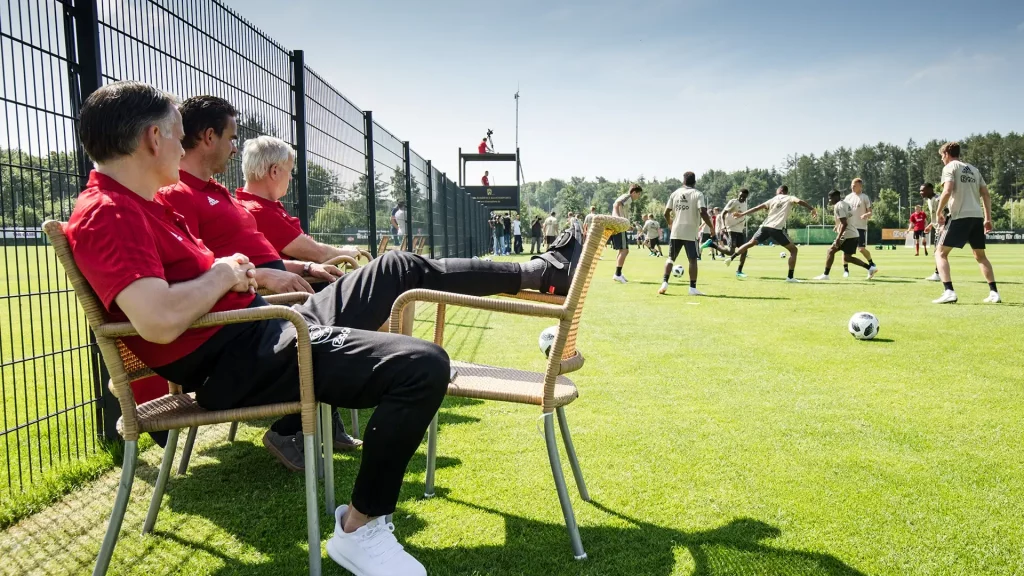Introduction
If you’ve ever found yourself analysing every move on the football pitch, asking why a player is positioned a certain way, or noting down promising talents even during a weekend game, then perhaps the role of a football scout is your true calling. The idaea of turning a passion for football into a profession that involves discovering hidden gems, analysing raw talent, and helping clubs build their future is not just appealing but deeply rewarding.
So, how do you become a football scout? What does it entail? Whether you’re an avid fan with an eye for talent or someone looking for a professional pivot, this guide will take you through the essential steps, skills, and insider tips to carve your path in the world of football scouting.
What Does a football Scout Do?
Before diving into the “how,” it’s essential to understand the role of a football scout. Scouts are the eyes and ears of football clubs, responsible for discovering new talent and evaluating the skills of potential recruits. A football scout doesn’t just watch games for enjoyment; they meticulously analyse players’ technical, physical, and psychological attributes, often over several matches, and in different contexts to get the full picture of a player’s ability and potential.
Key Responsibilities:
- In-depth Player Analysis:
Scouts break down a player’s technical skills, such as dribbling, passing, positioning, and tactical acumen. They also evaluate how a player adapts to different game dynamics. For instance, they may observe how a player behaves in defencive situations when under pressure or their ability to switch positions during a counter-attack. - Attending Matches and Training Sessions:
football scouts travel extensively to various games, leagues, and training sessions. They might watch dozens of matches per week across different levels, from youth academies and amateur leagues to professional fixtures, both in domestic leagues and international tournaments. Consistency of performance across multiple games is often a critical metric scouts look for. - Statistical Analysis and Reporting:
Scouts utilise advanced metrics and data analytics to gather key performance data, from passing accuracy to defencive success rates. These statistics complement observational analysis, allowing scouts to combine objective data with qualitative judgements. - Identifying Physical and Mental Attributes:
A player’s physical traits (speed, agility, endurance) are as important as mental attributes such as resilience, game intelligence, focus, and stress management. A great football scout can spot these often-subtle qualities by observing not just moments of brilliance but how players react when things go wrong. - Networking:
Building relationships with coaches, agents, and other scouts is crucial for gathering inside information about potential recruits. The football world is tightly connected, and scouts rely on their network to get access to players who may not yet be in the spotlight but have immense potential.

Importance of football Scouts to Clubs
The role of a football scout is critical for clubs seeking to build a sustainable talent pipeline. By identifying talent early, scouts help teams avoid expensive transfers while discovering under-the-radar players who can be developed into future stars. Clubs like Ajax, Borussia Dortmund, and Barcelona have developed reputations for their excellent scouting systems, finding talent early and nurturing it into world-class players.
One great example of scouting excellence is Jamie Vardy’s rise from non-league football to Premier League stardom. Scouts from Leicester City recognised his potential while he was playing at Fleetwood Town, a non-league club. Through careful observation and analysis, the scouts made a recommendation that ultimately led to his signing. Today, Vardy is a Premier League champion and international player, and this success storey underscores how critical good scouting can be for a club.
Becoming a football Scout in 2024
1. Educational Foundation
Starting with a solid educational foundation is an excellent first step toward becoming a football scout. While formal education isn’t mandatory in all cases, it can significantly enhance your credibility, understanding, and knowledge base, especially when combined with experience.
Key Areas of Focus:
- Sports-Related Degree:
A degree in sports management, sports science, or kinesiology provides a deeper understanding of athletes’ physiology and psychology. Sports science courses might cover biomechanics, nutrition, recovery, and injury prevention, all of which are crucial for evaluating a player’s physical capabilities and long-term development potential. - Sports Psychology:
Understanding player psychology is becoming increasingly important in scouting. Players with strong mental fortitude, good decision-making, and leadership qualities often excel under pressure. A course in sports psychology can provide valuable insights into evaluating a player’s mindset. - Scouting Certifications:
While not essential, certifications can significantly boost your career. Various programmes, such as the FA’s Talent Identification courses or UEFA’s scouting licences, offer modules on player analysis, ethical scouting practises, and emerging trends in football.
Examples of Certifications:- FA Level 1 in Talent Identification: Offers an introduction to the key concepts of identifying young talent.
- PFSA (Professional Football Scouts Association) Level 2: A comprehensive programme that covers scouting techniques, player assessment, and the use of data in scouting.
- Talent Identification Programme (UEFA): A course designed to help scouts learn best practises for identifying talent across different levels.
- Workshops and Seminars:
Attending workshops on the latest scouting software (such as Prozone, Wyscout, or Instat) can also be helpful. These platforms allow scouts to analyse players quantitatively using video and data, gaining deeper insights into player performance beyond what’s visible during a live match.
Key Takeaway:
A formal education equips you with a solid theoretical base, but certifications and hands-on courses specifically geared toward scouting will give you practical tools needed in the industry. Combining theory with real-world experience creates a strong foundation for your career.
2. Gain Practical Experience
No amount of theoretical knowledge can replace real-world experience. To effectively transition into a football scouting career, you must engage with the game at various levels. Here’s how to do it:
Practical Experience Options:
- Volunteering at Local Clubs:
Volunteering is an excellent way to get your foot in the door. Whether you’re working with youth academies, grassroots clubs, or local amateur teams, this experience gives you the opportunity to observe talent up close. You’ll develop your ability to spot technical and physical traits early on. - Attending Matches:
From youth academies to professional leagues, attending matches at various levels allows you to see how players perform in diverse environments. You can observe the tactical structure, technical ability, and mental resilience of players, which will sharpen your eye for talent. Consistently attending local games helps build your understanding of the sport at every level. - Internships with Sports Organisations:
In 2024, internships with sports organisations or a club’s scouting department provide structured, real-world experience. For example, organisations like IMG or major clubs in the MLS, Premier League, and La Liga may offer internship opportunities in scouting or player recruitment. These experiences expose you to the inner workings of the scouting profession and give you the chance to work directly with seasoned professionals. - Shadowing Experienced Scouts:
Shadowing a seasoned scout can be one of the most valuable experiences on your journey. Not only do you learn how they operate, but you also pick up on nuances, like body language reading, that aren’t always taught in courses. Shadowing gives you insights into how scouts prepare for matches, use scouting software, and present findings to coaching staff. - Formal Game Analysis:
Platforms like Hudl, Wyscout, and Instat allow you to practise your game analysis skills by studying player footage and match data. Watching full games, as well as specific player actions or positions, allows you to practise breaking down performances and gaining an understanding of player behaviour under different tactical conditions.
Key Takeaway:
Experience is key when learning how to become a football scout. Volunteering, internships, and game analysis will help you develop your observational skills, build your confidence in talent evaluation, and expand your professional network, paving your way into the scouting world.

3. Develop Essential Scouting Skills
Scouting is both an art and a science. Here’s a breakdown of the core skills every football scout needs to succeed:
Core Scouting Skills:
- Game Analysis Mastery:
The ability to break down a game is a fundamental skill for a scout. This involves understanding formations, player roles, and team strategies. Watching matches and writing up comprehensive reports on specific players will help sharpen this skill. Your ability to assess a player’s technical ability—whether it’s their first touch, decision-making, or how they handle high-pressure situations—can differentiate you from other scouts. - Player Metrics Understanding:
Modern football scouting is increasingly data-driven. Beyond the naked eye, scouts now rely on advanced statistics and data to assess a player’s abilities. Metrics like pass completion rate, interceptions, tackles won, and expected goals (xG) provide objective insights into a player’s performance over time. Master platforms like Opta to evaluate these metrics effectively and complement your qualitative assessments. - Tactical Acumen Evaluation:
The scout must understand a player’s tactical knowledge, such as their positioning, movement off the ball, and how they fit into the team’s overall strategy. For example, scouts observe whether a player can make intelligent runs, adapt to defencive schemes, or exploit spaces in the opposing team’s defence. - Physical and Mental Attribute Assessment:
Scouts are tasked with assessing a player’s speed, stamina, strength, and agility. But don’t overlook psychological traits like leadership, resilience, decision-making, and emotional intelligence. For instance, how does a player react when their team is losing? How do they handle pressure during crucial moments in the game? These factors play an essential role in determining a player’s potential for success at higher levels. - Reporting Skills:
Clear, concise reporting is the currency of the scouting world. A well-written report synthesises data-driven insights with qualitative observations, allowing the club’s management and coaching staff to make informed decisions. Your ability to write effective scouting reports is essential—clubs rely on these reports to evaluate potential signings, and clear communication is key to getting your message across.
Key Takeaway:
Developing skills like game analysis, statistical understanding, and concise reporting will set you apart as a scout. Effective scouts can bridge data with real-world observation, providing clubs with valuable insights into a player’s potential.
4. Building a Professional Network
Success as a football scout isn’t just about what you know; it’s also about who you know. Building a strong professional network will open doors to job opportunities and provide insider tips on emerging talents that may not be on anyone else’s radar.
Networking Strategies:
- Attend Industry Events:
Conferences like Soccerex, Scouting World, and the United football Coaches Convention are ideal places to meet other professionals, including scouts, coaches, and agents. These events often feature presentations on the latest trends in scouting, player analysis, and data-driven scouting technologies. - Join Professional Associations:
Becoming a member of organisations like the PFSA or the International Association of Football Academies (IAFA) provides access to exclusive networking opportunities, industry news, and workshops. Membership in these associations not only boosts your credentials but also keeps you connected with professionals in the scouting community. - Social Media:
Platforms like LinkedIn and Twitter are invaluable for engaging with the football industry. Follow and interact with top scouts, coaches, and analysts to stay up-to-date on the latest developments. You can also join forums dedicated to football scouting and analysis, such as the BigSoccer forum, to share insights and connect with like-minded individuals. - Volunteer for Scouting Projects:
Volunteering for a club’s scouting department or offering your services for youth tournaments is a fantastic way to gain practical experience and network with industry professionals. Many scouts get their first big breaks by making valuable contributions as volunteers.
Key Takeaway:
Building a network takes time but is essential for long-term success. The more connections you have within the football world, the easier it will be to gain access to job opportunities, emerging talent, and important industry trends.
5. Choosing a Scouting Niche
Specialising in a niche within the scouting world can help set you apart from other scouts. Whether you’re passionate about youth scouting, excel at analysing data, or prefer to focus on a specific geographic region, choosing a niche allows you to become a subject matter expert and increase your value to clubs.
Niche Areas in football Scouting:
- Youth Scouting:
Youth scouts focus on identifying raw talent at an early age, working closely with youth academies, grassroots teams, and development leagues. Clubs that focus on youth development rely on scouts to bring in promising players who can be nurtured into future stars. Examples of successful youth academies include La Masia (Barcelona), Ajax Academy, and Sporting CP (Portugal). - Geographic Specialisation:
This allows scouts to become experts in certain regions, such as South America or Eastern Europe, which are renowned for producing world-class talent. Scouts who have deep knowledge of a specific region often have an edge, as they know the local leagues, development programmes, and rising stars. - Position-Specific Scouting:
Position-specific scouts focus on evaluating players in specific positions, such as goalkeepers, defencive midfielders, or wingers. These scouts are often experts in the technical and tactical requirements of these positions, providing clubs with in-depth insights into players who may fill critical gaps in the team. - Women’s football:
With the rise of professional women’s leagues, this is a rapidly expanding niche. Many clubs are now investing in their women’s teams, and there is an increasing demand for scouts who specialise in women’s football. The NWSL in the United States and the Women’s Super League (WSL) in England are examples of leagues that have seen tremendous growth. - Data-Driven Scouting:
The integration of advanced analytics into football scouting has created a demand for data-driven scouts. These scouts use platforms like Wyscout, Instat, and Opta to analyse player performance metrics and make data-backed recommendations. This approach is particularly valuable for identifying players who may not stand out visually but have impressive underlying statistics.
Key Takeaway:
Specialising in a niche can increase your value to clubs. Whether you’re focused on youth scouting, geographic regions, specific player positions, or data-driven analysis, becoming a subject matter expert in a particular area can help you stand out in the competitive world of football scouting.

6. Developing Scouting Reports
One of the most critical aspects of a football scout’s job is report writing. An effective scouting report helps clubs make informed decisions about signing new players. Scouts need to be able to distill large amounts of data and qualitative observations into concise, actionable reports.
Elements of a Strong Scouting Report:
- Technical Skills:
Assess a player’s dribbling, passing, shooting, tackling, and ball control. Break down how they perform in different game situations (e.g., under pressure, in open play, or in set pieces). - Physical Attributes:
Evaluate key physical attributes such as speed, stamina, strength, and agility. These traits determine a player’s ability to compete at higher levels, and many clubs place a significant emphasis on physicality, especially for positions like defenders and forwards. - Mental Traits:
Assess the player’s leadership, resilience, decision-making, game intelligence, and ability to handle pressure. How do they react when their team is losing or under stress? Do they stay composed or make rash decisions? - Tactical Understanding:
Evaluate the player’s ability to understand and execute tactical instructions. How well does the player adapt to different formations or strategies? Can they read the game and make smart decisions on the fly? - Statistical Analysis:
Include relevant metrics such as passing accuracy, tackles made, interceptions, dribbles completed, and expected goals (xG). Data-backed insights provide clubs with objective information that complements qualitative observations.
Key Takeaway:
A strong scouting report combines qualitative observations with quantitative data. Reports should be clear and concise, highlighting both strengths and weaknesses while offering a balanced view of the player’s potential. Your ability to write insightful, data-driven reports will directly impact the club’s decision-making process.
Concluding
Becoming a football scout is a journey that requires passion, education, and practical experience. By building the necessary skills, gaining hands-on exposure, and developing a professional network, you can make an impact in the world of football scouting. With dedication and persistence, you’ll be able to spot and nurture future stars, helping shape the future of the sport.
The world of football scouting is constantly evolving, with new technologies, analytics, and global trends shaping how scouts discover and evaluate talent. Whether you’re analysing a young talent at a local game or working for a premier club’s scouting department, your role as a scout will be vital in shaping the landscape of football.
As the demand for skilled scouts continues to grow, now is the perfect time to build your foundation and pursue your dream career in football scouting. The opportunities are vast, and the impact you can make on a club’s success is immeasurable. With the right combination of knowledge, skills, and determination, you can carve out a successful career in this exciting and dynamic field.

